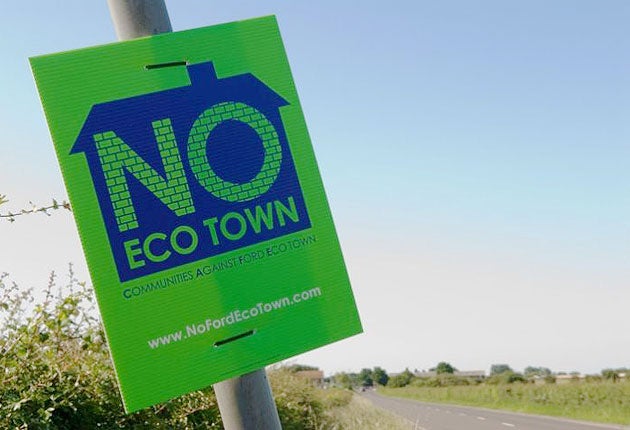Campaigners lose eco-town legal challenge

Campaigners today lost their High Court challenge over the Government's eco-towns project, but vowed to carry on their protest.
A judge rejected their complaint that there had been a failure to consult the public properly over the policy to build "environmentally-friendly" towns to meet housing shortages.
Mr Justice Walker, sitting at the High Court in London, stressed the project was "at a relatively early stage" and there would be future opportunities for consultation.
He ruled the Government had not followed unlawful procedures or attempted to "outflank" the planning system. He also rejected accusations that it had proceeded with "a closed mind".
The failed legal challenge was spearheaded by the Better Accessible Responsible Development (Bard) campaign, which is opposed to 6,000 new homes being built near Long Marston, Warwickshire, 10 miles south of Stratford-upon-Avon.
The group, formed by residents from across Warwickshire, Worcestershire and Gloucestershire, believe the scheme could cause "irreparable damage to this beautiful part of middle England".
Bard was joined in the application for judicial review by Weston Front, a group fighting proposals for the Weston Otmoor eco-town in Oxfordshire where there are plans for 15,000 new homes. Their counsel described the plans as "a ghastly shadow" hanging over their lives.
A third pressure group, CASCET, which is against plans for the Pennbury eco-town in Leicestershire, put forward formal submissions to the High Court in support of Bard's application.
The Government announced a shortlist of potential sites last April in its consultation document Eco-Towns: Living A Greener Future.
But the protesters said the consultation process conducted so far "was bound to inspire cynicism and concern" and there should be fuller consideration of the views of local residents, including on whether eco-towns were in principle the best way to tackle housing shortages.
David Bliss, chairman of the Bard campaign, said after the ruling: "We are disappointed but this is by no means the end of the road for Bard's challenges to the Middle Quinton proposal.
"Labelling objectors Nimbies (Not in My Back Yard) is a lazy government response to a well thought out opposition to the current eco-town programme.
"No less than 47 national, regional and local representative bodies agree that poorly-sited new towns will neither meet their promised eco-agenda nor provide affordable housing in places where people want to live."
Mr Bliss added: "Our principle remains compelling - local people deserve to be properly consulted on government policies that directly impact them.
"Contrary to government assertions, we care deeply both about the environment and our communities.
"Experience from Europe suggests that the way to success is developing eco-quarters as part of urban extensions rather than building new towns in isolated rural spots and expecting them to be environmentally friendly solutions to the housing demand."
Mr Bliss said: "In short, poorly-sited eco-towns will lead to soulless commuter-based dormitory towns becoming expensive white elephants of the future. We do not intend to stand by and watch this happen.
"Despite today's ruling we hope the government will listen to local people and their democratically elected representatives before progressing with the programme."
Housing Minister Margaret Beckett welcomed the court's ruling.
She described eco-towns as "a unique opportunity to deliver much-needed affordable housing, built in a way which, by incorporating the very latest energy-saving techniques, benefits both residents and the wider community".
Ms Beckett said: "I am pleased the judge has recognised the Government has acted properly and dismissed the review on all grounds.
"Several local authorities are working with us on potential eco-towns and our second consultation, on both the shortlist of locations and our proposed standards, remains open.
"Once we have identified a final shortlist of potential locations, developers will need to go through the local planning process - giving people a third opportunity to have their say."
Subscribe to Independent Premium to bookmark this article
Want to bookmark your favourite articles and stories to read or reference later? Start your Independent Premium subscription today.

Join our commenting forum
Join thought-provoking conversations, follow other Independent readers and see their replies